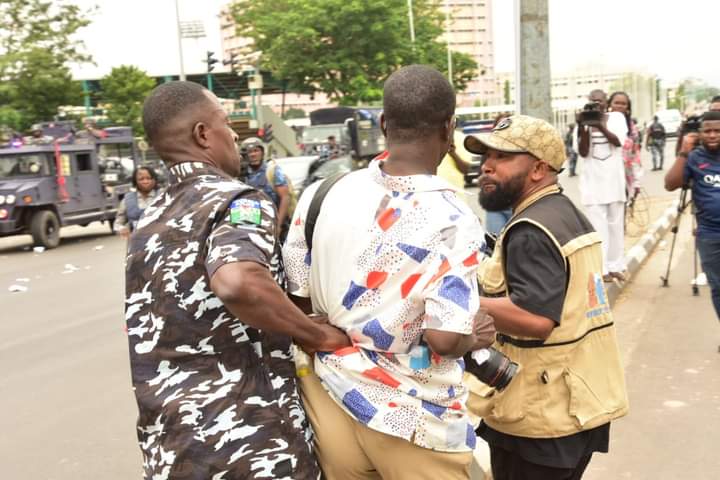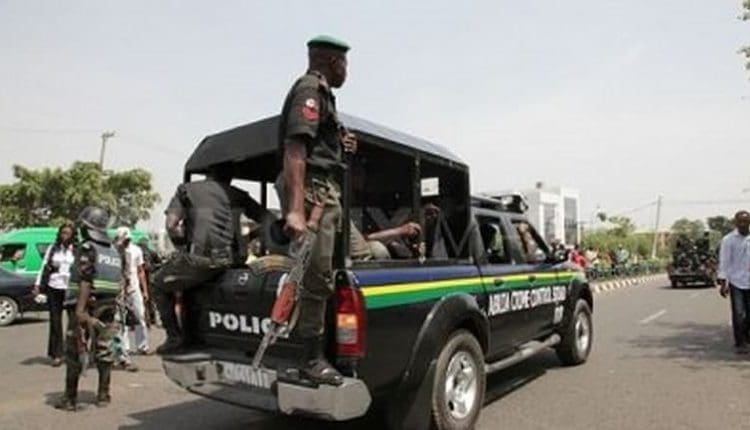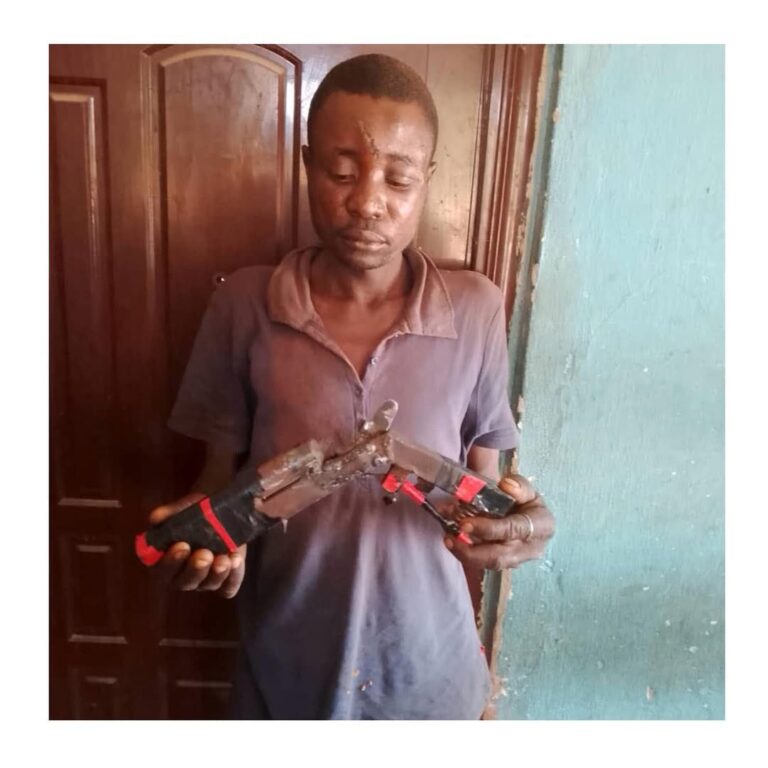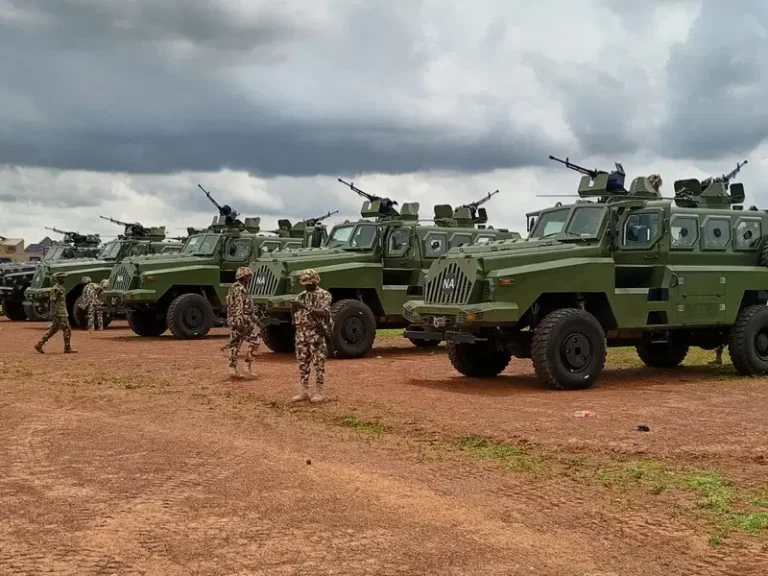
The Committee to Protect Journalists(CPJ) has revealed that at least 56 journalists were attacked and harassed during the 10-day #EndBadGovernance protests across Nigeria.
The global advocate for press freedom also expressed alarm over the increasing violence against media practitioners in Nigeria and other African countries.
According to a report published on its website on Wednesday, the CPJ said the report is based on interviews with victims, local media reports, and verified visual evidence.
It also highlighted the perils faced by journalists in many African nations during protests and the authorities’ failure to ensure their safety and hold perpetrators accountable.
The report noted that all but one of the journalists—a reporter for government-owned Radio Nigeria—worked for privately owned media outlets.
Citing the case of Yakubu Mohammed, a Premium Times newspaper reporter, the CPJ quoted him as saying, “He hit me with a gun butt,” recalling how he was struck by a police officer while reporting on protests in Nigeria’s capital of Abuja on August 1.
Mr Mohammed, a journalist, was brutally beaten by two officers, who seized his phone and threw him into a police van, despite his clear identification as a press member.
“He is one of at least 56 journalists who faced assault or harassment while covering Nigeria’s #EndBadGovernance protests.
“The Committee to Protect Journalists, CPJ, reports that Nigeria is not alone in its attacks on press freedom.
“In Kenya, at least a dozen journalists have been targeted by security forces during recent youth-led protests, with one reporter shot with rubber bullets and several others hit with teargas canisters.
“Similarly, Ugandan authorities have used force to suppress anti-corruption and anti-high living cost demonstrations, while a Ghanaian court has banned planned protests.
“These incidents highlight a disturbing trend of governments in sub-Saharan Africa silencing journalists and stifling press freedom during anti-government protests.
“Globally, attacks on the press often spike during moments of political tension, CPJ explained, noting that in Senegal, at least 25 journalists were attacked, detained, or tear gassed while reporting on February’s protests over delayed elections.
“Last year, CPJ found that more than 40 Nigerian journalists were detained, attacked, or harassed while reporting on presidential and state elections. In 2020, at least a dozen journalists were attacked during the #EndSARS campaign to abolish Nigeria’s brutal Special Anti-Robbery Squad (SARS) police unit,” the report said.
Giving some details on the recent assault on journalists, CPJ stated that on July 31, 2024 in Lagos State, police officers harassed Bernard Akede, a reporter with News Central TV, and his colleagues, digital reporter Eric Thomas and camera operators Karina Adobaba-Harry and Samuel Chukwu, forcing them to pause reporting on the planned protests at the Lekki toll gate.
The report lamented that on August 1 in Abuja, “police officers arrested Jide Oyekunle, a photojournalist with the Daily Independent newspaper, and Kayode Jaiyeola, a photojournalist with Punch newspaper, as they covered protests.
“In northern Borno State, at least 10 armed police officers forcefully entered the office of the regional broadcaster Radio Ndarason Internationale (RNI) and detained nine members of staff for five hours.
“Those held said that police accused them of publishing “fake news” in the arrest documentation, and RNI’s project director David Smith told CPJ that the raid was in response to the outlet’s reporting via WhatsApp on the protests.”
It noted that the detained staff were the “head of office Lami Manjimwa Zakka; editor-in-chief Mamman Mahmood; producer Ummi Fatima Baba Kyari; reporters Hadiza Dawud, Zainab Alhaji Ali, and Amina Falmata Mohammed; head of programs Bunu Tijjani; deputy head of programs Ali Musa; and information and communications technology head Abubakar Gajibo”.
Also in Abuja, CPJ added that police officers threw tear gas canisters at Mary Adeboye, a camera operator with News Central TV; Samuel Akpan, a senior reporter with TheCable news site; and Adefemola Akintade, a reporter with the Peoples Gazette news site.
It said, “In northern Kano city, unidentified attackers wielding machetes and sticks smashed the windows of a Channels Television-branded bus carrying 11 journalists and a car carrying two journalists.
“The journalists were: reporters Ibrahim Ayyuba Isah of TVC News broadcaster, whose hand was cut by glass; Ayo Adenaiye of Arise News broadcaster, whose laptop was damaged; Murtala Adewale of The Guardian newspaper, Bashir Bello of Vanguard newspaper, Abdulmumin Murtala of Leadership newspaper, Sadiq Iliyasu Dambatta of Channels Television, and Caleb Jacob and Victor Christopher of Cool FM, Wazobia FM, and Arewa Radio broadcasters; camera operators John Umar of Channels Television, Ibrahim Babarami of Arise News, Iliyasu Yusuf of AIT broadcaster, Usman Adam of TVC News; and multimedia journalist Salim Umar Ibrahim of Daily Trust newspaper.
“In southern Delta State, at least 10 unidentified assailants opposed to the protest attacked four journalists: reporters Monday Osayande of The Guardian newspaper, Matthew Ochei of Punch newspaper, Lucy Ezeliora of The Pointer newspaper, and investigative journalist Prince Amour Udemude, whose phone was snatched.”
The report added, “Osayande told CPJ by phone that they did not make a formal complaint to police about the attack because several police officers saw it happen, but added that the state commissioner for information, Efeanyi Micheal Osuoza, had promised to investigate. Osuoza told CPJ by phone that he was investigating the matter and would ensure the replacement of Udemude’s phone.
Furthermore, it said on August 3 in Abuja’s national stadium, “masked security forces fired bullets and tear gas in the direction of 18 journalists covering the protests, several of whom were wearing ‘Press’ vests”.
It said, “The journalists were: Premium Times reporters Abdulkareem Mojeed, Emmanuel Agbo, Abdulqudus Ogundapo, and Popoola Ademola; TheCable videographer Mbasirike Joshua and reporters Dyepkazah Shibayan, Bolanle Olabimtan, and Claire Mom; AIT reporter Oscar Ihimhekpen and camera operators Femi Kuku and Olugbenga Ogunlade;
“News Central TV camera operator Eno-Obong Koffi and reporter Emmanuel Bagudu; the nonprofit International Centre for Investigative Reporting’s video journalist Johnson Fatumbi and reporters Mustapha Usman and Nurudeen Akewushola; and Peoples Gazette reporters Akintade and Ebube Ibeh.
“Kuku dislocated his leg and Ademola cut his knees and broke his phone while fleeing.”
In Abuja’s Wuse neighbourhood, it was noted that unidentified men robbed Victorson Agbenson, political editor of the government-owned Radio Nigeria broadcaster, and his driver, Chris Ikwu, at knifepoint as they covered a protest.
CPJ said on August 6 in Lagos State, unidentified armed men hit four journalists from News Central TV and their vehicle with sticks. The journalists were News Central TV’s Akede, camera operator Adobaba-Harry, reporter Consin-Mosheshe Ogheneruru, and camera operator Albert David.
When contacted by CPJ on August 16, Abuja police spokesperson Josephine Adeh denied any police involvement in attacks on the media, requesting evidence before abruptly ending the call. She also accused CPJ of harassment.
Similarly, police spokespersons in Delta State [Bright Edafe] and Kano State [Haruna Abdullahi] claimed their officers had received no complaints about attacks on the press.
In Lagos State, spokesperson Benjamin Hundeyin referred CPJ to the Complaint Response Unit, where an unidentified person claimed to have no information about attacks on journalists. Subsequent calls and messages from CPJ went unanswered.
These responses suggest a lack of accountability and transparency from Nigerian police regarding alleged attacks on journalists.
CPJ made multiple attempts to contact Borno State Commissioner for Information, Usman Tar, for comment, but all calls and messages went unanswered, according to the report.


